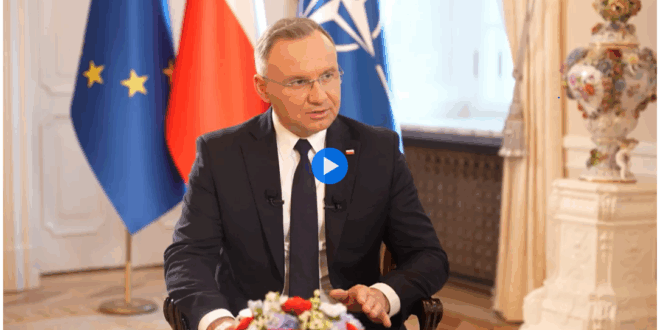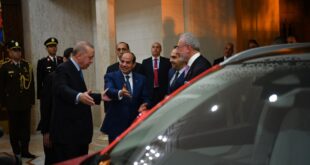Muhamad Yehia.. Cairo
In an exclusive interview with Euronews, Polish President Andrzej Duda stressed that deterrence, not fear, is NATO’s best defence strategy.
In recent months, speculation has swirled over whether the United States might reduce its military presence in Poland and other countries on NATO’s eastern flank. But Polish President Andrzej Duda is quick to dismiss those concerns.
In an exclusive interview with Euronews, he reaffirmed that American troops remain a steadfast part of Poland’s defence infrastructure — and that their presence is not weakening but evolving.
“There are several thousand American soldiers on our territory all the time, about 10,000. And this cooperation is close, constant and it is getting stronger, so I have no such doubts,” Duda said.
“It was very much in a sense, one could say, rotation in Jasionka, which simply meant transferring responsibilities into the hands of other units. And it happened. We were informed about it, just as we were informed that these soldiers would be transferred to other places in Polish,” he added
“I will certainly persuade the president of the United States to have more of these American units here, so that they guarantee security to an even greater extent.”
Reassuring stability: Presence, not withdrawal
Duda is clear in his view that NATO’s eastern flank is not being weakened, but rather undergoing routine adjustments. For him, the long-term presence of US forces in Poland is a key strategic guarantee.
Despite speculation over troop rotations in Jasionka, he emphasised that the alliance with the United States remains strong and proactive
Last year, ahead of the NATO summit in Washington, Duda called for increased defence spending among alliance members.
This year, during discussions in Brussels with NATO Secretary General Mark Rutte, he formally proposed increasing the defence contribution from 3 to 4% of GDP.
For Poland, which shares a border with Belarus and lies close to the war in Ukraine, the issue is more than political—it’s existential.
Another core component of Poland’s deterrence policy is the continued presence of NATO troops, especially American forces, on Polish soil
Negotiating with Trump a ‘hard business game’
Asked whether he was disappointed with US President Donald Trump’s second term in office, Duda said that he is aware that Trump was elected by American taxpayers, and therefore he must take these interests into account first.
“Although I always try to show that the interests that the United States has in Europe are also strategic interests, that the United States derives measurable benefits in relations with Europe. And this is the balance system, which has been going on uninterruptedly since World War II,” Duda added.
Commenting on the idea of imposing tariffs on European products by the US, the Polish president said that Trump is specific as he came into politics from the business world.
“For most of his life, he was a businessman in the very tough American economic market. In industries that are extremely competitive in the United States … in the development industry. He owned casinos,” Duda explained.
“So this is a man who is taught a specific business game and has his own hard business methods and games that have been developed for decades. He transfers them to politics and plays very hard.”
“But this … is simply a business game that President Donald Trump has brought to politics at the moment and is firmly pursuing it in his second term. You have to negotiate with him, you have to negotiate hard with him, simply put,” Duda added.
Warnings about Putin’s KGB mindset
Despite numerous controversies, Duda still hopes that Trump and the US are able to negotiate a peace agreement ending Moscow’s war in Ukraine, because Russia only counts with the US.
He recalled that during one of his visits to Washington, he warned Trump and his associates that the Russian president is not an ordinary politician. He is a KGB agent who has completely different conditions, and this should be taken into account, according to Duda.
“He is educated to be a Soviet intelligence officer with very specific skills, which he certainly has and which he used in practice, working in East Germany in the so-called GDR … as a representative of the Russian Soviet intelligence,” the Polish president explained.
“And this must be taken into account when talking to this man. He is not exactly a politician. He is to a large extent still just an officer of the Russian services.”
Lessons from history
According to Duda, in the years preceding Russia’s full-scale invasion of Ukraine in early 2022, Europe made many mistakes in its policy towards Russia, making too many concessions.
Duda also mentioned the NATO summit in Bucharest in 2008, during which, despite earlier promises, Georgia and Ukraine did not receive the Membership Action Plan (MAP). This happened as a result of the resistance of France and Germany.
This, in turn, emboldened Putin to invade Georgia in 2008 and then annex Crimea in 2014.
“In fact, Russia was playing with the greats of Europe, and in fact it was strengthening itself to attack once again, which it did in 2022 with its open, frontal, full-scale, as we say, aggression against Ukraine,” Duda said.
Only the US can broker peace, Duda says
Duda has said that only the United States — and in particular, his US counterpart — has the power to bring Russia’s ongoing war in Ukraine to an end.
Duda also warned that a future peace deal will require painful compromises from both sides, including concessions from Ukraine, and called for renewed transatlantic cooperation to ensure long-term stability in the region.
“Today my conclusion is absolutely unequivocal, there is no one outside the United States who can stop Putin,” Duda said.
“That’s why I believe that President Donald Trump, with his determination, can bring this war to an end.”
Regional cooperation and the Three Seas Initiative
Andrzej Duda also spoke about the Three Seas Initiative, of which he was one of the founders in 2015, together with Croatian President Kolinda Grabar Kitarović.
A total of 13 countries located in the Adriatic, Baltic and Black Sea regions belonging to the European Union, are part of the initiative to cooperate with each other in the field of transport and energy security, among others.
“For us, the most important thing was energy security and the most important were the opportunities for business development, but also tourism,” Duda said.
The Three Seas Initiative is not a competition for the European Union, but on the contrary, a deepening of regional cooperation within the bloc, he added.
The jubilee summit of the Three Seas Initiative will take place in Warsaw on Monday and Tuesday.
 موقع وجه أفريقيا موقع وجه أفريقيا هو موقع مهتم بمتابعة التطورات في القارة الأفريقية
موقع وجه أفريقيا موقع وجه أفريقيا هو موقع مهتم بمتابعة التطورات في القارة الأفريقية



